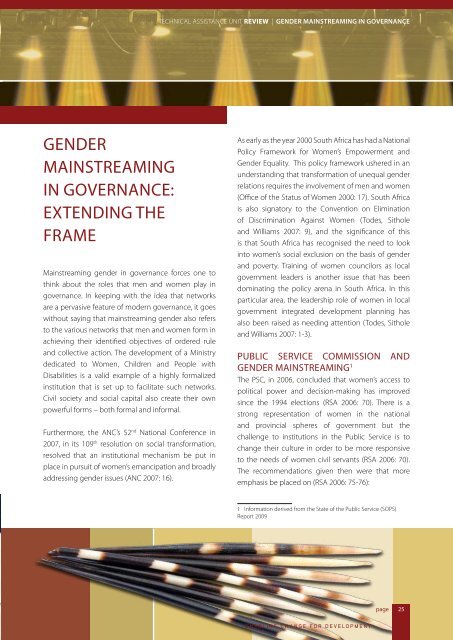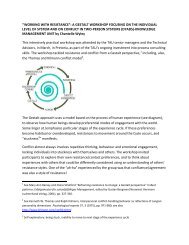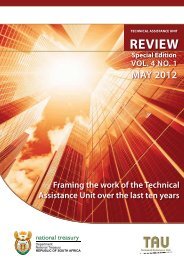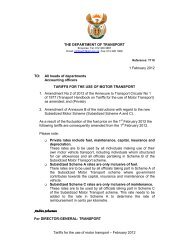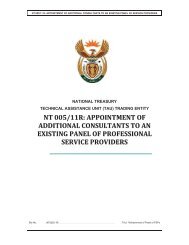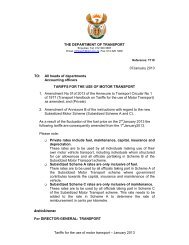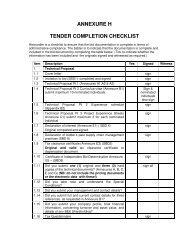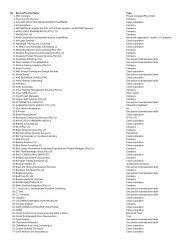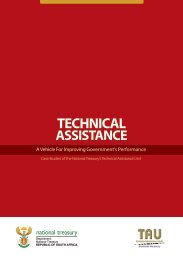Review 3 final 2 - TAU - National Treasury
Review 3 final 2 - TAU - National Treasury
Review 3 final 2 - TAU - National Treasury
You also want an ePaper? Increase the reach of your titles
YUMPU automatically turns print PDFs into web optimized ePapers that Google loves.
TECHNICAL ASSISTANCE UNIT REVIEW | Gender mainstreaming in governance<br />
Gender<br />
mainstreaming<br />
in governance:<br />
Extending the<br />
Frame<br />
Mainstreaming gender in governance forces one to<br />
think about the roles that men and women play in<br />
governance. In keeping with the idea that networks<br />
are a pervasive feature of modern governance, it goes<br />
without saying that mainstreaming gender also refers<br />
to the various networks that men and women form in<br />
achieving their identified objectives of ordered rule<br />
and collective action. The development of a Ministry<br />
dedicated to Women, Children and People with<br />
Disabilities is a valid example of a highly formalized<br />
institution that is set up to facilitate such networks.<br />
Civil society and social capital also create their own<br />
powerful forms – both formal and informal.<br />
Furthermore, the ANC’s 52 nd <strong>National</strong> Conference in<br />
2007, in its 109 th resolution on social transformation,<br />
resolved that an institutional mechanism be put in<br />
place in pursuit of women’s emancipation and broadly<br />
addressing gender issues (ANC 2007: 16).<br />
As early as the year 2000 South Africa has had a <strong>National</strong><br />
Policy Framework for Women’s Empowerment and<br />
Gender Equality. This policy framework ushered in an<br />
understanding that transformation of unequal gender<br />
relations requires the involvement of men and women<br />
(Office of the Status of Women 2000: 17). South Africa<br />
is also signatory to the Convention on Elimination<br />
of Discrimination Against Women (Todes, Sithole<br />
and Williams 2007: 9), and the significance of this<br />
is that South Africa has recognised the need to look<br />
into women’s social exclusion on the basis of gender<br />
and poverty. Training of women councilors as local<br />
government leaders is another issue that has been<br />
dominating the policy arena in South Africa. In this<br />
particular area, the leadership role of women in local<br />
government integrated development planning has<br />
also been raised as needing attention (Todes, Sithole<br />
and Williams 2007: 1-3).<br />
Public service commission and<br />
gender mainstreaming 1<br />
The PSC, in 2006, concluded that women’s access to<br />
political power and decision-making has improved<br />
since the 1994 elections (RSA 2006: 70). There is a<br />
strong representation of women in the national<br />
and provincial spheres of government but the<br />
challenge to institutions in the Public Service is to<br />
change their culture in order to be more responsive<br />
to the needs of women civil servants (RSA 2006: 70).<br />
The recommendations given then were that more<br />
emphasis be placed on (RSA 2006: 75-76):<br />
1 Information derived from the State of the Public Service (SOPS)<br />
Report 2009<br />
page 25<br />
Enabling change for development


